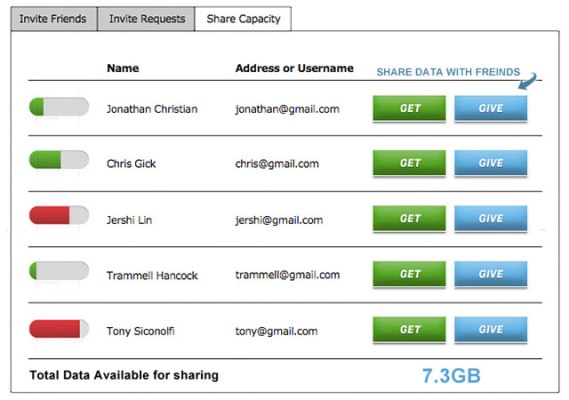Freemium wireless service provider FreedomPop has been pumping out its fair share of hardware lately, and its momentum seems to have been received favorably by its backers. The company, which aims to dole out 500MB of free WiMAX data to the masses, has raised $4.3 million in funding from current investors DCM and Mangrove Capital and finally rolled out its oft-touted social data sharing feature.
Frankly, it’s about time. FreedomPop has been talking up its social data concept for the past six months, and managed to push out three WiMAX data devices before bringing the feature online. The idea? To give users full control over their monthly data allotments by allowing them to request and transfer bandwidth with other FreedomPop members.
It’s quite a change from the traditional model that most established wireless carriers adhere to — rather than letting a chunk of a data plan go to waste because it wasn’t used before the end of a bill cycle, users can give that bandwidth away to friends in need in 50MB chunks. For now, there’s no way for users to ask for specific amounts of data, but FreedomPop CEO Stephen Stokols says that particular feature is already in the works.
As for what FreedomPop intends to do with that infusion of capital, the answer may not be what you expect. Stokols said that “very little” of it would be used on the development of new hardware; instead, FreedomPop is planning to focus on broadening its customer base and testing new marketing channels. With the service still in beta Stokols was reluctant to provide a firm number of registered users but he eventually admitted that “hundreds of thousands” of people have registered FreedomPop accounts — not too shabby considering that FreedomPop hasn’t done any advertising yet.
Just because Stokols doesn’t plan to use this money for a more pronounced hardware push doesn’t mean that FreedomPop is about to start skimping on its device portfolio. The company has noted in the past that it plans to support Android devices within the next six months, and its true ambitions are even bigger:
“Data access to any mobile device, that’s the real goal here,” said Stokols. “We have our initial set of devices, we looked at marketshare, and we’ve established the business model. Now we’re working on bringing the service to all devices, and many things are coming to fruition.”
FreedomPop may indeed be expanding its hardware portfolio with modems meant for the home and a newfangled LTE clip meant for tablets of all kinds, but one of its most prominent products still hasn’t made its way into consumer hands. The company’s WiMAX iPhone 4/4S case was what effectively put FreedomPop on the map (unless you count the terribly vague press release the young company released in December 2011), but thanks to the case’s curious antenna placement they’ve been locked up in FCC testing limbo for some time. It’s no doubt a bummer for some of FreedomPop’s earliest backers, but it’s not the only question that FreedomPop has to deal with right now. With Softbank, Sprint, and Clearwire all locked up in a sort of network-centric soap opera, one has to wonder how FreedomPop’s long-term ambitions could be affected.
